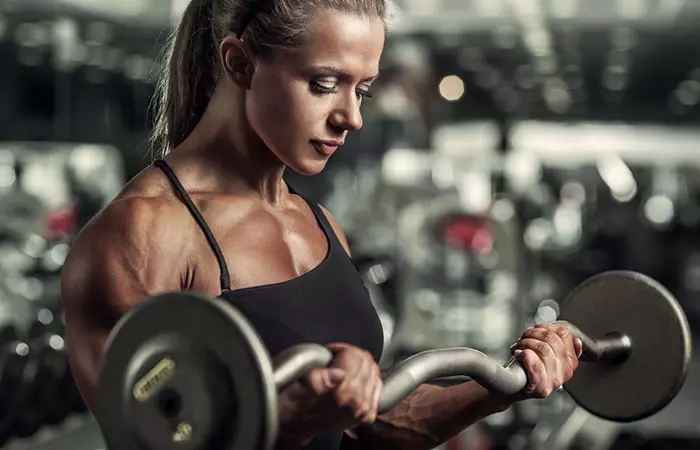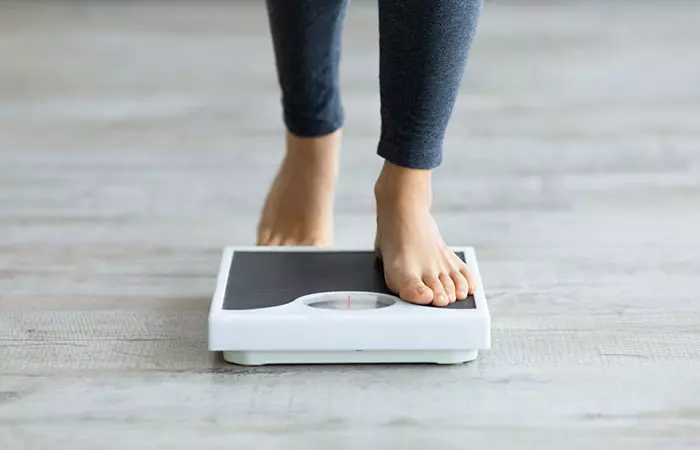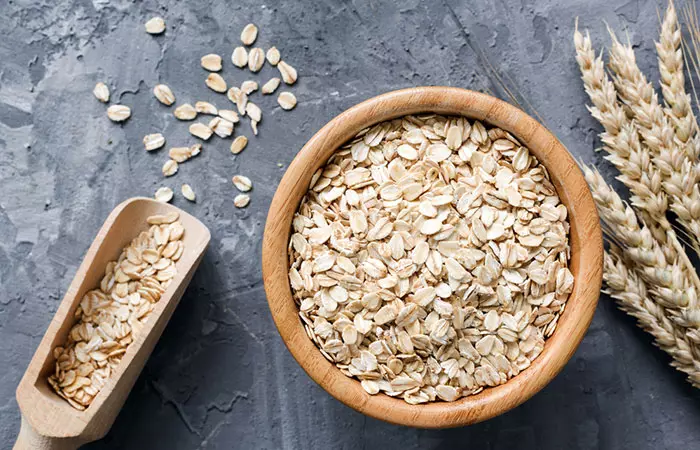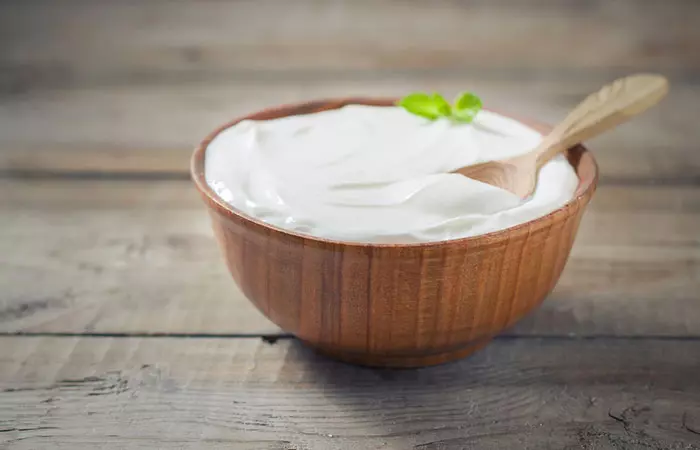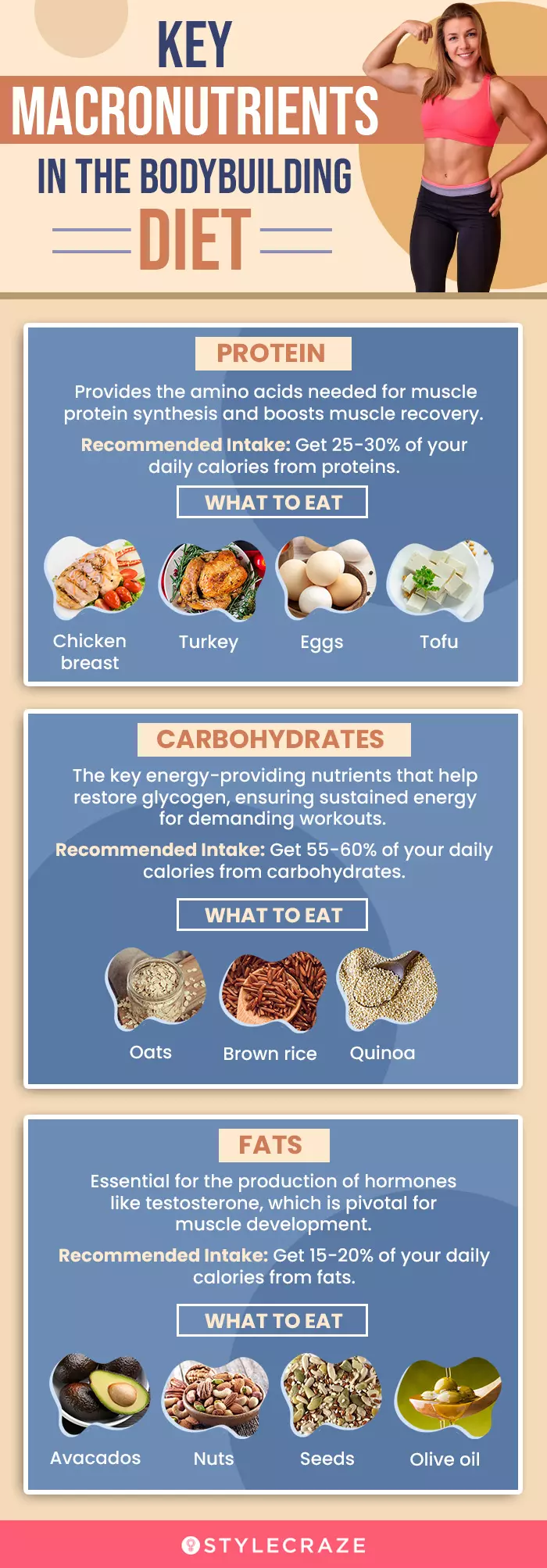What Is The Bodybuilding Diet?
The bodybuilding diet is a nutritional regimen designed to support the goals of bodybuilders. Bodybuilding is a form of strength training focused on developing and sculpting muscle mass to ultimately achieve a highly defined and muscular physique. One must adhere to certain key principles to achieve optimal results in bodybuilding. They are:
Strength Training
Regular and intense training stimulates muscle growth and definition. Strength training uses resistance provided by your own body or external objects like weights to tone your muscles. It often involves targeted exercises that work on various muscle groups with progressively increasing weights and repetitions to challenge the muscles (1).
Dietary Approach
It is characterized by specific nutritional strategies personalized to support muscle development and recovery. The science behind the bodybuilding diet is rooted in the manipulation of macronutrients and caloric intake to stimulate muscle hypertrophy or growth. This diet focuses on the consumption of proteins, fats, and carbs in a specific ratio as they are essential to promote optimal health and help you get the physique you desire. Protein intake, in particular, is critical as it supplies the amino acids needed for muscle protein synthesis (2). Carbohydrates help restore glycogen, ensuring sustained energy for demanding workouts (3). Fats are essential for the production of hormones like testosterone, which is pivotal for muscle development (4), (5). Bodybuilders are often advised to aim for a typical macronutrient breakdown of approximately 25% to 30% of daily calories from protein, about 55-60% from carbohydrates, and roughly 15% to 20% from fats (6). Depending on your bodybuilding goals, there are two phases of the diet you can choose to follow:
Bulking Phase: During the bulking phase, bodybuilders typically increase their calorie intake, with a focus on higher carb and protein intake to support muscle gain. They pair this with a focus on intense resistance training as it stimulates muscle growth and strength development. This phase typically lasts for several months, giving the body ample time to accumulate muscle mass.
Cutting Phase: In contrast, during the cutting phase, bodybuilders reduce calorie intake and often increase protein consumption while decreasing carbs and fats to shed excess body fat while preserving muscle mass. This phase is all about achieving a lean and defined physique and generally lasts for a few months or until the desired level of leanness is achieved.
Bodybuilders continuously switch between these phases to optimize their physique. They strategically build muscle and then sculpt it by shedding excess body fat. Thus, a well-structured bodybuilding diet, combined with effective training, can yield impressive results in terms of muscle size, definition, and overall physique. However, it is important to customize the diet to individual goals and monitor progress carefully. This means involving an expert, such as a registered dietitian or sports nutritionist along with your healthcare physician, who can assess your specific goals, body composition, activity level, and dietary preferences to create a tailored plan. They also help evaluate your overall health and consider any pre-existing medical conditions or dietary restrictions. Their tips and guidance can help you formulate an ideal nutrition meal plan that helps fuel your performance. A well-suited bodybuilding diet can not only enhance muscle growth but also offer various additional benefits. Keep scrolling to learn more about them.
Benefits Of The Bodybuilding Diet
Along with improved muscle strength and recovery, the bodybuilding diet also provides the following benefits:
1. May Help In Weight Management
The bodybuilding diet is a type of high-protein diet that makes up about 20-30% of your daily energy intake. These diets may help you lose more weight than low-protein diets (15-20%) because they keep you satiated, preserve lean body mass, and increase the calories your body burns during digestion (7).
2. May Promote Bone Health
Studies have shown that a diet rich in fruits, vegetables, low-fat dairy, whole grains, poultry, fish, nuts, and legumes may promote good bone health. It leads to improved bone density and a reduced risk of fractures (8). There is also moderate evidence indicating that a higher protein intake may provide protective benefits for bone mineral density in the lumbar spine when compared to a lower protein intake (9). This diet also focuses on the intake of essential nutrients like calcium and vitamin D to further support bone health (10).
3. May Improve Insulin Sensitivity
A well-balanced diet can enhance insulin sensitivity, helping regulate blood sugar levels. This is particularly beneficial for individuals at risk of or dealing with type 2 diabetes (11).
4. May Promote Heart Health
Incorporating heart-healthy foods like lean proteins, nuts, and whole grains into your daily diet can lead to better cardiovascular health. These foods help lower cholesterol levels and reduce the risk of heart disease (12).
5. May Boost Mental Well-Being
This diet plan is generally paired with strength training exercises that may positively impact mental health. The endorphins released during workouts and the nutritional support for brain function can reduce stress and enhance mood (13).
6. May Improve Your Sleep
This diet may help regulate your sleep pattern. Eating balanced macronutrients and following a regular meal schedule may help you get better sleep quality and duration (14).
7. May Reduce The Risk Of Chronic Diseases
The combination of muscle-building activities and a nutritious diet may reduce the risk of chronic diseases like obesity, heart disease, and certain cancers (15). Thus, to capitalize on these advantages effectively, it is essential to plan a diet as per your needs. Unlock the full potential of the bodybuilding diet by aligning your dietary choices with your specific fitness objectives. Keep reading to find out how you can do so successfully.
How Do I Plan A Diet For Bodybuilding?
Keep the following points in mind while planning a personalized diet for bodybuilding:
1. Manage Your Expectations
Set clear and realistic goals and define your exact bodybuilding needs. It could be focusing on muscle gain, fat loss, or simply overall strength improvement. Having well-defined objectives can better guide your dietary choices.
2. Calculate Your Caloric Needs
Calorie intake directly impacts bodybuilding goals by determining whether you gain muscle (caloric surplus), lose fat (caloric deficit), or maintain your current physique (maintenance calories). Adjusting your calorie intake accordingly is essential for achieving specific fitness objectives. You can determine your daily caloric requirements based on factors like age, gender, weight, activity level, and goals. Online calculators and consultations with experts like a registered dietitian can assist in this process.
3. Focus On Nutritious Meals
Your diet should include whole, nutrient-dense foods like lean meats, fish, poultry, vegetables, fruits, and low-fat dairy. These foods provide essential vitamins and minerals for overall health.
4. Balance Macronutrients Appropriately
The ratio of macronutrients in a bodybuilding diet can vary depending on individual goals, preferences, and dietary needs. As previously mentioned, bodybuilders generally follow a typical daily macronutrient breakdown of approximately 25-30% of daily calories from protein, 55-60% from carbohydrates, and around 15-20% from fats. However, you should consult a healthcare professional or certified dietitian to get a customized macronutrient breakdown based on your specific goals and health condition.
5. Prioritize Pre- and Post-Workout Nutrition
Tailor your pre-workout and post-workout meals to optimize your performance and recovery. A combination of protein and carbohydrates before and after workouts can be effective. Also, proper hydration is equally important. Aim to drink plenty of water to support your digestion, muscle function, and overall well-being.
6. Consider Protein-Based Supplements
Adding supplements like protein powder, creatine, and branched-chain amino acids (BCAAs) to your diet may help fill nutrient gaps, prevent nutrient deficiencies, and support muscle growth (16). However, keep in mind to consult with a healthcare provider or dietitian before adding supplements to your diet. Remember that planning a bodybuilding diet is not a one-size-fits-all approach. Patience and consistency are key as you work toward achieving your desired physique and overall fitness. Now that you have outlined your dietary strategy, the next step is knowing what to eat to achieve your goals. Find out what you can include in this diet in the next section.
Foods To Eat On The Bodybuilding Diet
Here are the key food groups you need to include in your diet to fuel your performance:
1. Lean Proteins
Chicken breast Turkey Lean cuts of beef (in moderation) Fish Eggs Tofu Legumes
2. Complex Carbohydrates
Oats Brown rice Quinoa
3. Healthy Fats
Avocados Nuts Seeds Olive oil
4. Fruits And Vegetables
Apple Berries Cherry Kale Spinach Tomatoes
5. Dairy
Greek yogurt Cottage cheese Plant-based dairy alternatives
Aside from these foods, you can also include protein shakes, sports drinks, and other nutritional supplements. However, check out the following section to learn more about the foods you need to steer clear of.
Foods To Avoid On The Bodybuilding Diet
Here are the key food groups you need to exclude from your diet:
1. Processed Foods
Canned fish, vegetables, or fruits Breakfast cereals Microwave-ready meals Certain types of cheese Processed meats like bacon, sausage, and ham.
2. Sugary Beverages
Soda Artificial fruit juices Drinks with added sugar
3. Trans Fats
Fried foods Baked goods
4. Excessive Alcohol
Beer and any craft ciders Limit even hard low-calorie liquors like rum, vodka, and whisky to just a glass
5. Snacks
High-sodium snacks Snacks with minimal nutritional value
6. Fatty Cuts Of Meat
Pork belly Ribeye T-bone steaks Chicken thighs
With the aforementioned foods in mind, we have created a sample bodybuilding meal plan to help you get started on this diet. Scroll down to learn more.
7-Day Sample Bodybuilding Meal Plan
Remember to consult with a registered dietitian for personalized guidance. This is a sample meal plan, and you need to adjust your portion sizes and macronutrient ratio based on your specific dietary needs and fitness goals. Thus, with proper professional guidance, the bodybuilding diet can help you maximize your gains. However, every coin has two sides, and this diet has its advantages and disadvantages. Keep reading to learn more about them.
Pros And Cons Of The Bodybuilding Diet
Here are some pros and cons of the bodybuilding diet that you should consider before adopting it into your daily routine: Pros
Focuses on the consumption of nutritious meals. May help you build muscle strength, boost muscle recovery, and lose fat. May improve your overall health and well-being.
Cons
Can be restrictive in nature and lead to nutrient deficiencies if not followed correctly. Can be complicated to calculate your macros and require professional assistance, which may be expensive. Can be difficult to stick to and make socializing difficult.
What is the 40-40-20 diet for bodybuilding? The 40-40-20 diet for bodybuilding is a macronutrient distribution plan where 40% of daily calories come from carbohydrates, 40% from protein, and 20% from fats. This ratio is designed to support muscle growth and fitness goals by providing balanced nutrition. Is meal timing important for bodybuilding? Meal timing is important for bodybuilding as consuming the right nutrients before and after workouts can optimize your performance and recovery. Pre-workout meals should contain carbs and protein for energy, while post-workout meals should focus on protein to aid muscle repair and growth (17). How can I adjust my bodybuilding diet for vegetarian or vegan preferences? You can rely on plant-based protein sources like tofu, tempeh, legumes, and quinoa. Try incorporating a variety of vegetables, fruits, and whole grains as they provide essential nutrients. Additionally, taking plant-based protein supplements can help you meet your protein requirement in the absence of animal products. Discover how protein, carbs, and fats play an important role in sculpting your physique and optimizing your workouts in the following video. It breaks down the essentials of the bodybuilding diet for easy understanding.
